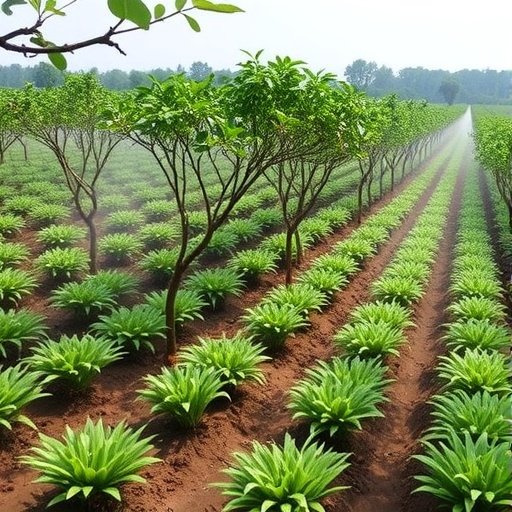Tropical regions are witnessing an alarming rate of climate change, where unpredictable rainfall patterns and rising temperatures pose significant threats to agriculture. Among the most affected sectors is cocoa farming, which is the backbone of many West African economies, particularly in Ghana. The research conducted by Tilahun, Amponsah, and Atampugre sheds light on the pressing need for sustainable supplemental irrigation systems to combat the changing environmental landscape faced by cocoa farmers in Ghana. Understanding these issues allows us to appreciate the critical role irrigation plays in ensuring food security and economic stability in these regions.
Cocoa production in Ghana has served as a major source of income for millions of farmers and their families. However, the erratic rainfall caused by climate change jeopardizes this vital crop. Over the years, studies have indicated that fluctuations in precipitation patterns lead to diminished yields and threaten the livelihoods of cocoa farmers. The authors of this pivotal study explore irrigation as a viable solution to address these challenges while promoting sustainable agricultural practices.
The authors argue that the development of supplemental irrigation strategies is a pressing necessity in the face of changing agroforestry landscapes. They highlight the traditional reliance on rain-fed agriculture, which is no longer sufficient to guarantee consistent crop output amid climatic volatility. The research emphasizes that implementing supplemental irrigation methods, such as drip and sprinkler systems, can enhance water use efficiency, thereby securing cocoa yields even during dry spells.
As Ghana’s cocoa landscape transforms due to climate pressures, the study calls for an integrated approach to agricultural practices. This involves not just the introduction of new irrigation techniques, but also education and training for farmers on how to adapt their cultivation methods to current and predicted climate scenarios. Empowering farmers with knowledge ensures they are equipped to manage their resources effectively, which is crucial for sustainable development.
The research also discusses the importance of policy frameworks that encourage sustainable irrigation practices. Governments and local authorities must recognize the significance of irrigation in enhancing food security. The article emphasizes that policymakers should prioritize investments in irrigation infrastructure, providing access to the necessary funds and technologies for cocoa farmers. Such investments not only increase productivity but also promote economic resilience in rural communities.
One of the significant findings of the research is the potential role of agroforestry systems in enhancing water management for cocoa production. Agroforestry, which involves the integration of trees and shrubs with crops, can improve soil moisture retention and reduce competition for water resources. The authors suggest that focusing on agroforestry can create a more sustainable and resilient cocoa farming system, capable of withstanding climate-related challenges.
Furthermore, the study illuminates the benefits of adopting a participatory approach in the development of supplemental irrigation systems. Involving local communities in the planning and implementation process ensures that the irrigation solutions are culturally appropriate and meet the farmers’ actual needs. It fosters ownership and accountability among the farming communities, leading to more successful outcomes and long-term sustainability.
As the research progresses, the authors underscore the necessity of continuous monitoring and evaluation of implemented irrigation strategies. This will help identify best practices and lessons learned from on-the-ground experiences. By sharing these insights among farmers and stakeholders, all parties can collectively work towards refining existing strategies and developing new solutions that address ongoing challenges.
Environmental sustainability and economic viability are also central themes throughout the research. The authors highlight that sustainable supplemental irrigation systems must be designed to minimize environmental impact, particularly concerning water resources. Using advanced techniques and technologies can optimize water use, ensuring that it meets both agricultural and ecological needs without compromising future resources.
The study also advocates for integrating social and economic considerations into the design and implementation of these irrigation systems. For instance, understanding the social dynamics within communities, such as gender roles and access to resources, is vital. Addressing inequities ensures that all farmers, regardless of background or gender, can benefit from improved irrigation practices.
In addition to the technical aspects, the piece frames the conversation around climate justice. The vulnerability of cocoa farmers to climate change is symptomatic of broader systemic issues within agricultural systems worldwide. The authors encourage a global discussion on equitable access to technological advancements and financial resources to empower vulnerable communities to adapt to changing conditions.
Looking forward, the research sets an ambitious agenda for stakeholders in Ghana’s cocoa industry. It serves as both a wake-up call and a roadmap for sustainable development strategies that prioritize integrated water management. A concerted effort among farmers, policymakers, and civil society is essential to create a resilient framework that not only addresses the current crisis but also anticipates future challenges in cocoa farming.
In conclusion, the insights presented by Tilahun, Amponsah, and Atampugre underscore the urgent need for a shift toward sustainable supplemental irrigation strategies in Ghana’s cocoa sector. Through cooperative engagement and technological innovation, the agricultural community can combat climate change’s adverse impacts, ensuring cocoa continues to thrive as a critical economic resource. The implications of this research extend beyond Ghana, offering valuable lessons for other cocoa-producing regions worldwide facing similar challenges.
Adopting sustainable irrigation practices not only secures the livelihoods of cocoa farmers but also enriches the broader ecosystem, ultimately contributing to a more resilient agricultural landscape ready to weather the storms of climate change.
Subject of Research: Sustainable supplemental irrigation development for Cocoa in Ghana
Article Title: Insight for sustainable supplemental irrigation development for Cocoa in changing Ghana’s agroforestry landscapes.
Article References:
Tilahun, S.A., Amponsah, A.K., Atampugre, G. et al. Insight for sustainable supplemental irrigation development for Cocoa in changing Ghana’s agroforestry landscapes. Discov Sustain 6, 883 (2025). https://doi.org/10.1007/s43621-025-01794-6
Image Credits: AI Generated
DOI: 10.1007/s43621-025-01794-6
Keywords: Cocoa, supplemental irrigation, climate change, sustainable agriculture, Ghana, agroforestry, economic resilience, participatory approach, water management.




